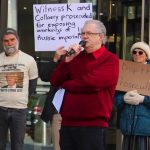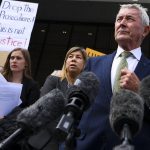Right from wrong
 Is it OK for Australia to bug our neighbouring countries’ negotiating teams? Who makes such decisions? Should corporate interests benefit from state surveillance and bugging? What’s is permissible under the Rule of Law (ROL) and the Rule of Morals and Ethics (RoME)? We need a Royal Commission to get to the bottom of the East Timor bugging scandal, to decide what is right and what is wrong for the future.
Is it OK for Australia to bug our neighbouring countries’ negotiating teams? Who makes such decisions? Should corporate interests benefit from state surveillance and bugging? What’s is permissible under the Rule of Law (ROL) and the Rule of Morals and Ethics (RoME)? We need a Royal Commission to get to the bottom of the East Timor bugging scandal, to decide what is right and what is wrong for the future.



 If national security is genuinely at risk, leakers should be prosecuted. But where Australia itself, its political leaders, top bureaucrats and spook agencies are the transgressors, ‘leakers’ should be rewarded and those who have trashed the nation’s reputation are the ones to go before a Royal Commission or court of law. Both the government and the opposition are behaving reprehensibly in relation to the Witness K/Bernard Collaery case, Dr Richie Gun says.
If national security is genuinely at risk, leakers should be prosecuted. But where Australia itself, its political leaders, top bureaucrats and spook agencies are the transgressors, ‘leakers’ should be rewarded and those who have trashed the nation’s reputation are the ones to go before a Royal Commission or court of law. Both the government and the opposition are behaving reprehensibly in relation to the Witness K/Bernard Collaery case, Dr Richie Gun says.
 Former High Court chief judge Robert French has delivered a less-than-innovative report on the issue of free speech on uni campuses. He proposes tinkering with new federal laws. But, says Law student Sam Coten, the universities themselves should take individual leads and live up to the promise on which the entire sector was founded nearly 1000 years ago.
Former High Court chief judge Robert French has delivered a less-than-innovative report on the issue of free speech on uni campuses. He proposes tinkering with new federal laws. But, says Law student Sam Coten, the universities themselves should take individual leads and live up to the promise on which the entire sector was founded nearly 1000 years ago.